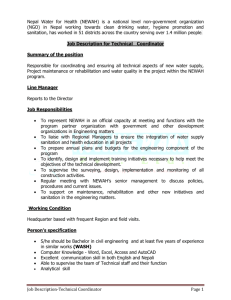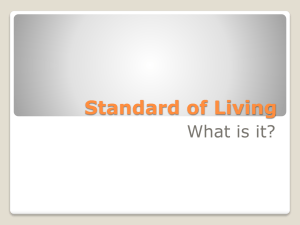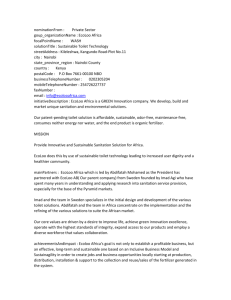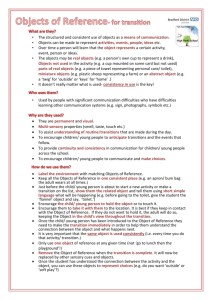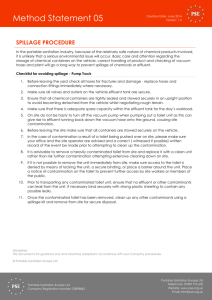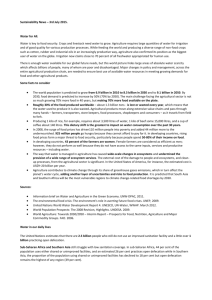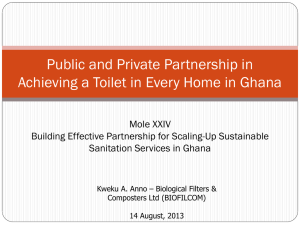3.2 Informal residential areas Demographics and other information
advertisement
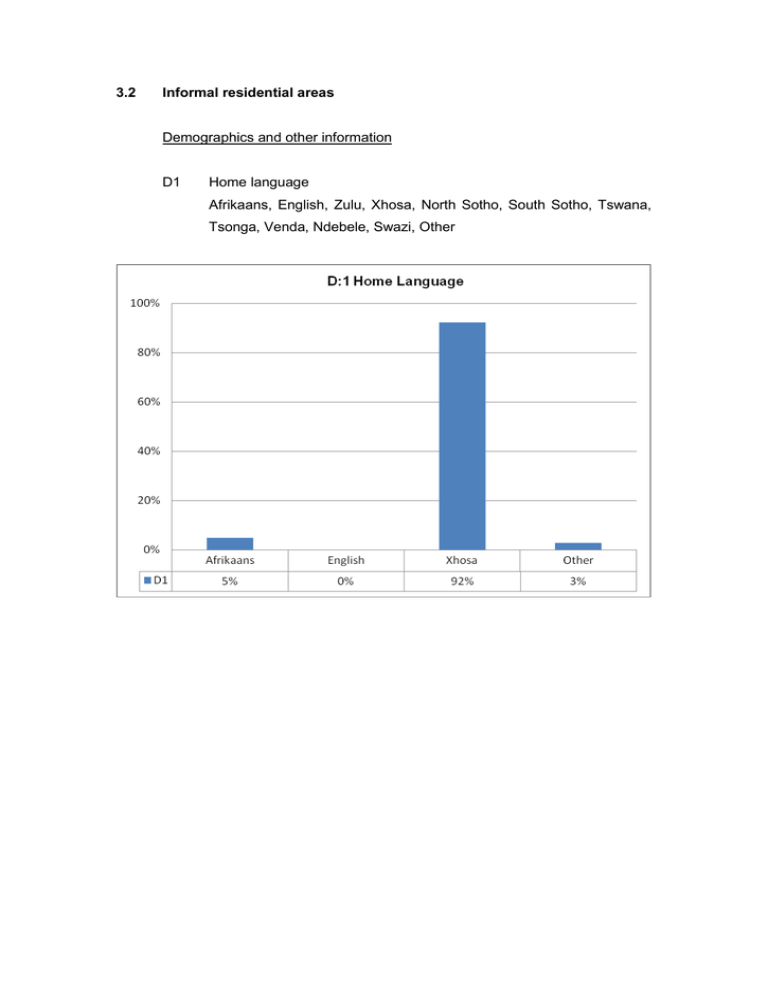
3.2 Informal residential areas Demographics and other information D1 Home language Afrikaans, English, Zulu, Xhosa, North Sotho, South Sotho, Tswana, Tsonga, Venda, Ndebele, Swazi, Other D2 To what extent do you understand the following languages? Afrikaans, English, Sepedi, Sesotho, Setswana, Tsonga, Venda, Xhosa Very well, quite well, not at all. D3 Age 16-24, 25-34, 35-49, 50-64, 65+ D4 Sex Female, male D5 Race African, Coloured, Indian, White D6 Monthly Household income R1 to R99 R1000 to R1099 R8000 to R8999 R100 to R199 R1200 to R1399 R9000 to R9999 R200 to R299 R1400 to R1599 R10000 to R10999 R300 to R399 R1600 to R1999 R11000 to R11999 R400 to R499 R2000 to R2499 R12000to R13999 R500 to R599 R2500 to R2999 R14000 to R15999 R600 to R699 R 3000 to R 3999 R16000 to R17999 R700 to R799 R4000 to R4999 R18000 to R19999 R800 to R899 R5000 to R5999 R20000 + R900 to R999 R6000 to R6999 Refused/Don’t know R1000 to R1099 R7000 to R7999 D7 Type of dwelling Informal dwelling / shack, house, flat, cluster house, town house / duplex flats, semi-detached Ia. INTERVIEWER RECORD: How far away is the closest outside tap? Ib & c. INTERVIEWER RECORD: b Can the tap be turned on and off? Yes, no c Does it leak? Yes, no 3.2.1 Question 1.a How satisfied are you with the overall performance of the City of Cape Town in providing water and sanitation services to residents? Would you say you are very satisfied, somewhat satisfied, dissatisfied, very dissatisfied or not sure? Ques tion 1 100% 90% 80% 70% 60% 50% 40% 30% 20% 10% 0% 2002 2003 2004 Not s ure 3 6 4 2006 4 V ery dis s atis fied 13 25 31 17 Dis s atis fied 12 24 28 32 S omewhat s atis fied 20 20 15 28 S atis fied 52 25 22 19 3.2.2 Question 2 Who would you contact when you experience … A leaking tap on site / in the dwelling? A water leak in the street? A broken/blocked toilet system? A blocked sewer in the street? Would you contact a plumber, the municipality, a friend / family member / fix it yourself or other? Q ues tion 2 H is tory 100% 80% 60% A leaking tap 40% A water leak in the street A broken / blocked toilet system A blocked sewer in the street 20% 0% O ther F riend / F amily member / F ix it mys elf Municipality P lumber 2003 2004 2006 2007 2003 2004 2006 2007 2003 2004 2006 2007 2003 2004 2006 2007 19 9 18 13 17 9 22 10 18 8 15 10 18 9 16 7 2 0 4 18 2 0 1 0 1 0 8 6 1 0 2 0 72 79 40 38 75 79 53 52 73 83 57 49 75 84 59 55 4 4 14 16 3 5 3 1 5 4 3 6 3 3 0 0 3.2.3 Question3 Thinking about the relationship between you personally as a user of Water Services, and the supplier of Water Services, i.e. the Municipality, which one of the following words would you use to describe you personally? As a resident, client, customer, consumer, citizen, part of the community or part of the people 3.2.4 Question 4.a How long ago, if ever, have you dealt with anyone from the municipality regarding any of the following? To report a water leak in the street. To report a water pipe burst. To report a blocked sewer in the street. To enquire about water restrictions. To enquire/complain about the quality of water. To enquire/complain about the smell from the waste water treatment plant. To enquire / complain about the waste water overflow at a nearby pump station. Would you say it was in the past month, in the past 6 months, in the past year, longer than a year ago or never? 3.2.5 Question 4.b To what extent would you agree with each of the following statements? I was treated in a professional and courteous manner. I was immediately directed to the person who could best see to my needs. The problem was resolved in a reasonable time. They followed up with me to find out if the problem had been sorted out. Do you: Completely agree, agree, disagree, disagree completely or are you not sure? 3.2.6 Question 4.c What method of contact did you mostly use during the contacts previously mentioned? Seeing someone. Calling the Water Services Hotline. Calling the City’s Call Centre. Sending a fax. Sending a letter. Sending an e-mail. 3.2.7 Question 4.d Have you dealt with anyone from the municipality regarding anything else? 3.2.8 Question 5a As far as you know, were the people in this area where you live consulted when decisions were taken about the provision of basic water and sanitation to this area? 3.2.9 Question 5b Which of the following were used to include the people and to provide information? Public meetings, brochures, door-to-door visits, councillor’s visits or other Q5b O ther, 0% C ouncillors vis its , 10% D oor-to-door vis its , 2% P ublic meetings B rochures B rochures , 0% D oor-to-door vis its C ouncillors vis its O ther P ublic meetings , 50% 3.2.10 Question 6a How satisfied or dissatisfied are you with each of the following? Taste of the water Smell of the water Colour of the water Texture of the water (hard / soft) Water pressure when you turn on the tap Quality of water to drink Would you say you are very satisfied, somewhat satisfied, dissatisfied, very dissatisfied or not sure? 3.2.11 Question 6b Why do you say that you are dissatisfied with the: Quality of water to drink? Taste of the water? Smell of the water? Colour of the water? Texture of the water (hard / soft)? Water pressure when you turn on the tap? Taste of the water Taste not good It is tasteless does not taste like a pure water Smell of the water Water leaking from the tap make a funny smell It cause infections to the children Colour of the water It cause infections to the children Because when they are cleaning water the smells funny The tap is located next to the toilets which are dirty Texture of the water Water pressure when you (hard / soft) turn on the tap Comes out hard and spreads everywhere Hard and spreads all over Water comes out very little sometimes does not come out at all Water doent come out taps are broken Big waste because its on all the time Pressure when turining on the tap is very high Quality of water to drink Its not right at all because you cant drink it Sometimes water colour and smell does not appear as usually 3.2.12 Question 7 To what extent you agree or disagree with each of the following: Most people are conscious of conserving water. It is our duty to report water leaks in the street. Waste water often pollutes our rivers. In Cape Town, water costs less than anywhere else in South Africa. We generally pay too much for water. We generally pay too much for the sewerage service. Most people pay for services over and above the free allocations. It is illegal to discharge rain water into the sewer system. It is illegal to discharge water from dishes / clothes / bath / shower into the storm water system. 3.2.13 Question 8 To what extent do you agree or disagree with the following statements regarding water restrictions? Most people adhere to water restrictions when they are introduced. Water restrictions are only introduced if they are really necessary. All the water restrictions have now been lifted. Last year’s stringent water restrictions should have stayed in place for longer. At the moment, no watering of gardens or lawns is permitted during the hours of 10h00 and 16h00. Do you agree completely, agree, disagree, disagree completely or are not sure? 3.2.14 Question 9.a Have you heard of the City’s National Water Week initiative? Yes or no? 3.2.15 Question 9.b Where did you hear about the City’s National Water week initiative? On the radio, in the news papers, on the television or other? 3.2.16 Question 9.c Did you, or any member of your family take part in any of the National Water Week Initiative activities? Yes, no, don’t know? 3.2.17 Question 10.a Thinking back over the past year, have you/your household changed your behaviour, specifically to conserve water, or not? 3.2.18 Question 10.b What was your main reason for changing your behaviour to conserve water? Information provided on water conservation. Had to use less, because the price of services increased. Had to adhere to the water restrictions. Other. 3.2.19 Question 10.c In what way have you / your household changed your behaviour specifically to conserve water over the past year? Installed a borehole on the property. Making use of water from a river. Re-using water from the bath / shower. Planted indigenous plants / water saving plants. Removed some of our lawn / grass. Changed the type of lawn / grass. Paved certain areas on the property. Gravelled certain areas on the property. Installed an irrigation system to water the garden. Installed a controlled irrigation system to water the garden. Installed drip irrigation. Installed water efficient fittings on the taps / shower. Installed a water saving device in the toilet (such as a hippo bag). Other. 3.2.20 Question 11a How many buckets of water does your household consume (e.g. for cooking, bathing, washing, drinking etc.) on average per day? 1 -2 buckets, 3 – 4 buckets, 5 – 6 buckets, 7 – 8 buckets, 9 – 10 buckets or 11 and more buckets 3.2.21 Question 12.a What is the water from the borehole mainly used for? To water the garden As drinking water To wash the car Personal Hygiene Other No data 3.2.22 Question 13a Which of the following services do you believe are part of your rights as a resident of Cape Town? In terms of water…Access to basic water supply (stand pipe within 200 metres from where you live) In terms of water…20 litres (2 buckets) per person, per day, free water Yes, no, don’t know 3.2.23 Question 13.b Do you pay for this water? 3.2.24 Question 13.c Which of the following services do you believe are part of your rights as a resident of Cape Town? In terms of basic sanitation…Health and hygiene education In terms of basic sanitation...Toilet facilities that are hygienic and safe In terms of basic sanitation…Access to a bucket type toilet In terms of basic sanitation…Access to a flush type toilet In terms of basic sanitation…Access to a pit/ventilated pit latrine In terms of basic sanitation…Access to a chemical toilet Yes, no, don’t know 3.2.25 Question 13.d Do you pay for this water? 3.2.26 Question 14.a Which of the following are provided? In terms of water…Access to basic water supply (stand pipe within 200 metres from where you live) In terms of water…20 litres (2 buckets) per person, per day, free water In terms of basic sanitation…Health and hygiene education In terms of basic sanitation...Toilet facilities that are hygienic and safe In terms of basic sanitation…Access to a bucket type toilet In terms of basic sanitation…Access to a flush type toilet In terms of basic sanitation…Access to a pit/ventilated pit latrine In terms of basic sanitation…Access to a chemical toilet Yes, no, don’t know 3.2.27 Question 14.b And which of these do you have continuous access to? In terms of water…Access to basic water supply (stand pipe within 200 metres from where you live) In terms of water…20 litres (2 buckets) per person, per day, free water In terms of basic sanitation…Health and hygiene education In terms of basic sanitation...Toilet facilities that are hygienic and safe In terms of basic sanitation…Access to a bucket type toilet In terms of basic sanitation…Access to a flush type toilet In terms of basic sanitation…Access to a pit/ventilated pit latrine In terms of basic sanitation…Access to a chemical toilet Yes, no, don’t know 3.2.28 Question 14.c Have you ever had something preventing you from accessing free basic water and sanitation? Yes, no 3.2.29 Question 14.d What prevented you? Broken handle The toilets are not working We do not have free toilets Not all of us have keys to the toilet Toilet are full and not been cleaned by municipality Bucket toilets are full and have not been emptied Toilets are broken and water is running. They use neighbours toilets and the neighbours are complaining Municipality does not fix the taps and toilets so we steal water from other people and use bushes as our toilets Toilets are vandalised and taps are broken I cannot use toilet because it is not available In terms of sanitation sometimes toilets are not in good condition they small and have lots of flies Toilets are not in use because of smell and dirt we decided not to use it anymore Water cuts by municipality over weekends Water cuts by municipality Stolen taps by some members of the community Lack of toilets in our area - had to go to the other areas to use a toilet Increase in water bills by the municipality 3.2.30 Question 14.e Is it in a working order, or not? In terms of water…Access to basic water supply (stand pipe within 200 metres from where you live) In terms of water…20 litres (2 buckets) per person, per day, free water In terms of basic sanitation…Health and hygiene education In terms of basic sanitation...Toilet facilities that are hygienic and safe In terms of basic sanitation…Access to a bucket type toilet In terms of basic sanitation…Access to a flush type toilet In terms of basic sanitation…Access to a pit/ventilated pit latrine In terms of basic sanitation…Access to a chemical toilet Yes, no, don’t know 3.2.31 Question 14.f Who provided the …? In terms of water…Access to basic water supply (stand pipe within 200 metres from where you live) In terms of water…20 litres (2 buckets) per person, per day, free water In terms of basic sanitation…Health and hygiene education In terms of basic sanitation...Toilet facilities that are hygienic and safe In terms of basic sanitation…Access to a bucket type toilet In terms of basic sanitation…Access to a flush type toilet In terms of basic sanitation…Access to a pit/ventilated pit latrine In terms of basic sanitation…Access to a chemical toilet Council / municipality, self / community, other or don’t know 3.2.32 Question 14.g And who maintains this service? In terms of water…Access to basic water supply (stand pipe within 200 metres from where you live) In terms of water…20 litres (2 buckets) per person, per day, free water In terms of basic sanitation…Health and hygiene education In terms of basic sanitation...Toilet facilities that are hygienic and safe In terms of basic sanitation…Access to a bucket type toilet In terms of basic sanitation…Access to a flush type toilet In terms of basic sanitation…Access to a pit/ventilated pit latrine In terms of basic sanitation…Access to a chemical toilet Council / municipality, self / community, other or don’t know 3.2.33 Question 14.h Who provided the funds to build these facilities? In terms of water…Access to basic water supply (stand pipe within 200 metres from where you live) In terms of water…20 litres (2 buckets) per person, per day, free water In terms of basic sanitation…Health and hygiene education In terms of basic sanitation...Toilet facilities that are hygienic and safe In terms of basic sanitation…Access to a bucket type toilet In terms of basic sanitation…Access to a flush type toilet In terms of basic sanitation…Access to a pit/ventilated pit latrine In terms of basic sanitation…Access to a chemical toilet Council / municipality, self / community, other or don’t know 3.2.34 Question 14.i Who provides the funds to maintain these facilities? In terms of water…Access to basic water supply (stand pipe within 200 metres from where you live) In terms of water…20 litres (2 buckets) per person, per day, free water In terms of basic sanitation…Health and hygiene education In terms of basic sanitation...Toilet facilities that are hygienic and safe In terms of basic sanitation…Access to a bucket type toilet In terms of basic sanitation…Access to a flush type toilet In terms of basic sanitation…Access to a pit/ventilated pit latrine In terms of basic sanitation…Access to a chemical toilet Council / municipality, self / community, other or don’t know 3.2.35 Question 15 How many families, including your own, have access to the toilet facilities that you are using? Question 16.a Which one of the following types of toilets do you believe is the most expensive to maintain? Bucket type toilet, flush type toilet, ventilated pit latrine, chemical toilet or don’t know Question 16.b Which one of the following types of toilets do you believe is the least expensive to maintain? Bucket type toilet, flush type toilet, ventilated pit latrine, chemical toilet or don’t know 3.2.36 Question 17 What are the hygiene-related problems that your household has encountered as a result of unhygienic sanitation services? Unpleasant smell, getting dirty, health problems or nothing 3.2.37 Question 18.a If you already have access to BASIC toilet facilities, would you be prepared to pay money to have access to a higher level of toilet facilities, or not? 3.2.38 Question 18.b How much would you be willing to pay per month for access to higher services such as an individual yard tap or on site-sanitation? 3.2.39 Question 19.a Do you think the regulation of water services is important? Yes, no, don’t know 3.2.40 Question 19.b Why? For health promotion and prevention of certain disease To conserve water by using it wisely Because people will be able to save water We need water to do most things People need to be educated to be water wise Municipality need to monitor our areas To always have access to clean and pure water anytime If regulation of water services cannot exist people can use water as they want and water in Cape Town can become scarce 4 19 6 5 1 1 1 1 3.2.41 Question 19.c How would you see yourself getting involved? By raising your individual concerns with a councillor By providing information to the relevant complaints desk when there are water interruptions or leaks By getting involved with a local committee that brings all the concerns that your area has with services and raises it directly with the water department Other 3.2.42 Question 20 Do you think it is important to report problems relating to water services and sanitation to the municipality? 3.2.43 Question 21 How satisfied are you with the overall performance of the City of Cape Town in providing services to residents? Would you say you are very satisfied, somewhat satisfied, dissatisfied, very dissatisfied or not sure?

